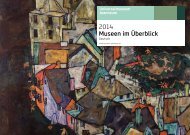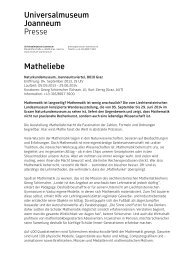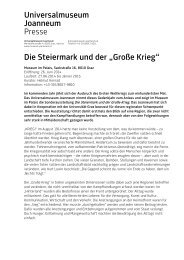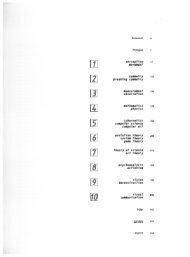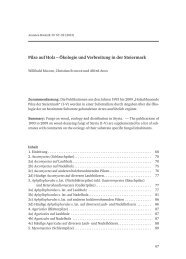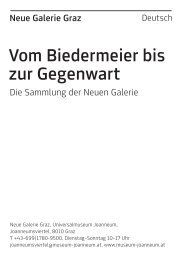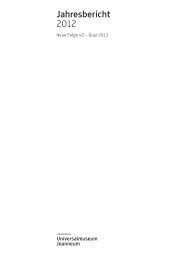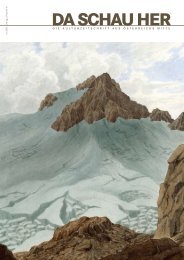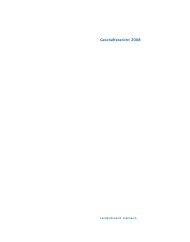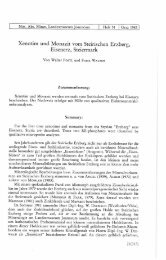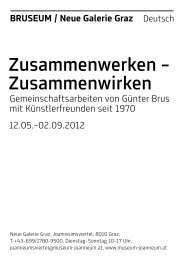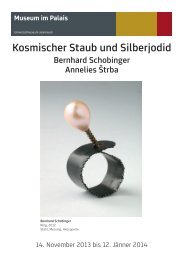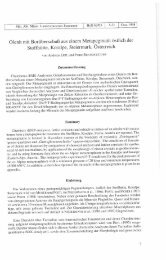Diana Thater gorillagorillagorilla - Universalmuseum Joanneum
Diana Thater gorillagorillagorilla - Universalmuseum Joanneum
Diana Thater gorillagorillagorilla - Universalmuseum Joanneum
Erfolgreiche ePaper selbst erstellen
Machen Sie aus Ihren PDF Publikationen ein blätterbares Flipbook mit unserer einzigartigen Google optimierten e-Paper Software.
Giorgio Agamben ist einer der meist<br />
diskutierten Philosophen Italiens.<br />
An der Universität Rom studierte<br />
er Rechtswissenschaften, nebenbei<br />
auch Literatur und Philosophie. 1966<br />
und 1968 nahm Agamben an zwei<br />
Seminaren von Martin Heidegger<br />
teil. Diese Begegnung fand ihren<br />
Niederschlag in Agambens erstem<br />
Werk L’uomo senza contenuto (1970).<br />
Als Herausgeber der italienischen<br />
Ausgabe der Schriften Walter<br />
Benjamins fand Agamben eine Reihe<br />
von Benjamins verloren geglaubten<br />
Manuskripten wieder auf. Seit Ende<br />
der achtziger Jahre beschäftigt sich<br />
Agamben vor allem mit politischer<br />
Philosophie. Derzeit lehrt er Ästhetik<br />
und Philosophie an der Universität<br />
IUAV Venedig. Er war Gastprofessor<br />
u.a. in Paris, Macerata, Verona,<br />
Berkeley, Los Angeles und Düsseldorf.<br />
Zu seinen bekanntesten Werken<br />
zählen Homo Sacer (1995) und<br />
Ausnahmezustand (Stato di eccezione,<br />
2003).<br />
Jason Smith unterrichtet Kunst<br />
im Graduiertenprogramm des<br />
Art Center College of Design in<br />
Pasadena, Kalifornien. Seine Essays<br />
sind in Artforum, Critical Inquiry,<br />
Rethinking Marxism und Il Manifesto<br />
erschienen. Vor Kurzem hat er ein<br />
Manuskript über das Verhältnis von<br />
Jacques Derridas Werk und der<br />
Tradition des dialektischen Materialismus<br />
abgeschlossen. Sein neues<br />
Forschungsprojekt widmet sich Guy<br />
Debord und dem Kino. Er ist außerdem<br />
Mitübersetzer der englischen<br />
Fassung von Jean-Luc Nancys Buch<br />
Hegel: L’inquiétude de négatif (Hegel:<br />
The Restlessness of the Negative,<br />
2002), zu der er auch die Einführung<br />
geschrieben hat.<br />
Bergit Arends has been the curator<br />
of Contemporary Arts at the Natural<br />
History Museum London since<br />
September 2005. She is currently<br />
commissioning artist Tania Kovats<br />
to create a new permanent art<br />
installation for the museum’s Central<br />
Hall and curates the exhibition After<br />
Darwin: Contemporary Expressions.<br />
Most recently she curated Mark Dion:<br />
Systema Metropolis, 2007. In 2006<br />
she curated The Ship: The Art of<br />
Climate Change in partnership with<br />
Cape Farewell. Arends graduated<br />
from the Royal College of Art, London,<br />
in 1997 with a MA in Visual Arts<br />
Administration: Curating and<br />
Commissioning Contemporary Art.<br />
Frans B. M. de Waal is a Dutch-born<br />
ethologist/biologist. Ever since his<br />
first book Chimpanzee Politics (1982),<br />
de Waal has drawn parallels between<br />
primate and human behavior. His<br />
articles and books – translated into<br />
fifteen languages – have made him<br />
one of the world’s most visible primatologists.<br />
His latest publications are<br />
Our Inner Ape (2005) and Primates<br />
& Philosophers (2006). De Waal<br />
is C. H. Candler Professor in the<br />
Psychology Department of Emory<br />
University and Director of the Living<br />
Links Center at the Yerkes National<br />
Primate Center in Atlanta.<br />
Time selected him in 2007 as one<br />
of the World’s 100 Most Influential<br />
People today.<br />
Laurence A. Rickels is an<br />
acknowledged theorist and certified<br />
therapist, and the author of a body<br />
of work on “unmourning”: Aberrations<br />
of Mourning (in part translated as<br />
Der unbetrauerbare Tod), The Case<br />
of California, and Nazi Psychoanalysis.<br />
Course-based books that, in a sense,<br />
popularize the “unmourning<br />
trilogy” include The Vampire Lectures<br />
(Vampirismus Vorlesungen) and<br />
The Devil Notebooks. Founding editor<br />
of the art magazine artUS, Rickels<br />
has also written extensively on<br />
contemporary art, most recently<br />
in book format: Ulrike Ottinger:<br />
The Autobiography of Art Cinema<br />
(Ulrike Ottinger: Eine Autobiografie<br />
des Kinos). Rickels is Professor of<br />
German and Comparative Literature<br />
at UC Santa Barbara and holds the<br />
Sigmund Freud Chair in Philosophy<br />
and Media at the European Graduate<br />
School. His new book, I Think I Am:<br />
Philip K. Dick, will appear in fall 2009.<br />
Giorgio Agamben is one 162 163<br />
of Italy’s most widely discussed<br />
philosophers. He studied law at<br />
the University of Rome, along with<br />
literature and philosophy. In 1966<br />
and 1968, Agamben took part in<br />
two Martin Heidegger seminars.<br />
This encounter led to Agamben’s first<br />
work, L’uomo senza contenuto (1970).<br />
As editor of the Italian edition of<br />
Walter Benjamin’s writings, Agamben<br />
rediscovered a series of Benjamin’s<br />
manuscripts that was thought to<br />
have been lost. Since the late 1980s,<br />
Agamben has focused mainly on<br />
political philosophy. He currently<br />
teaches aesthetics and philosophy<br />
at the IUAV University in Venice.<br />
He has been a visiting professor in<br />
Paris, Macerata, Verona, Berkeley,<br />
Los Angeles and Düsseldorf, etc.<br />
His best-known works include Homo<br />
Sacer (1995) and Stato di eccezione<br />
(State of Exception, 2003).<br />
Jason Smith is faculty member<br />
of the Graduate Studies in Art MFA<br />
program at Art Center College of<br />
Design in Pasadena, California. His<br />
work has been published in Artforum,<br />
Critical Inquiry, Rethinking Marxism,<br />
and Il Manifesto. He recently completed<br />
a manuscript on the relation<br />
between the work of Jacques Derrida<br />
and the tradition of dialectical materialism,<br />
and has begun working on<br />
a manuscript devoted to Guy Debord<br />
and the cinema. He also co-translated<br />
and introduced Jean-Luc Nancy’s<br />
Hegel: The Restlessness of the<br />
Negative (2002).



